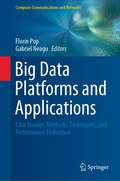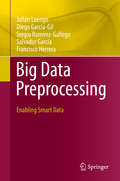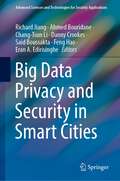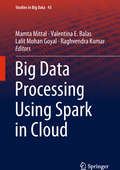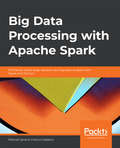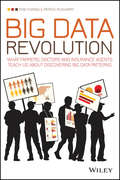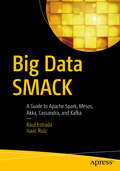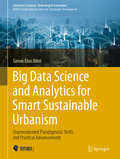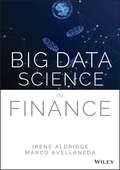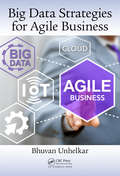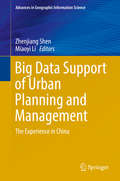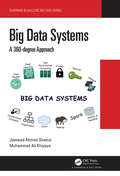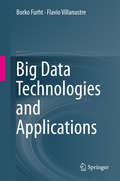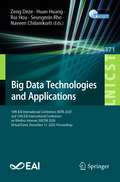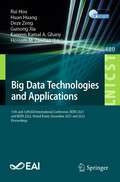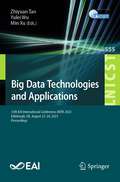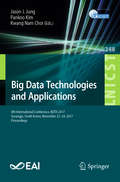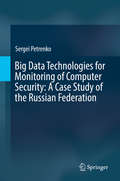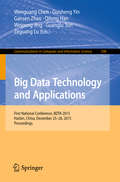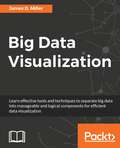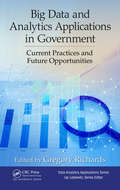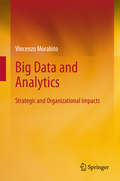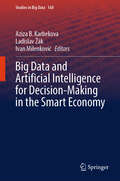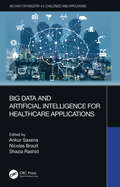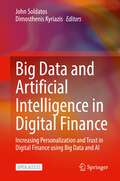- Table View
- List View
Big Data Platforms and Applications: Case Studies, Methods, Techniques, and Performance Evaluation (Computer Communications and Networks)
by Florin Pop Gabriel NeaguThis book provides a review of advanced topics relating to the theory, research, analysis and implementation in the context of big data platforms and their applications, with a focus on methods, techniques, and performance evaluation. The explosive growth in the volume, speed, and variety of data being produced every day requires a continuous increase in the processing speeds of servers and of entire network infrastructures, as well as new resource management models. This poses significant challenges (and provides striking development opportunities) for data intensive and high-performance computing, i.e., how to efficiently turn extremely large datasets into valuable information and meaningful knowledge.The task of context data management is further complicated by the variety of sources such data derives from, resulting in different data formats, with varying storage, transformation, delivery, and archiving requirements. At the same time rapid responses are needed for real-time applications. With the emergence of cloud infrastructures, achieving highly scalable data management in such contexts is a critical problem, as the overall application performance is highly dependent on the properties of the data management service.
Big Data Preprocessing: Enabling Smart Data
by Francisco Herrera Salvador García Julián Luengo Diego García-Gil Sergio Ramírez-GallegoThis book offers a comprehensible overview of Big Data Preprocessing, which includes a formal description of each problem. It also focuses on the most relevant proposed solutions. This book illustrates actual implementations of algorithms that helps the reader deal with these problems. This book stresses the gap that exists between big, raw data and the requirements of quality data that businesses are demanding. This is called Smart Data, and to achieve Smart Data the preprocessing is a key step, where the imperfections, integration tasks and other processes are carried out to eliminate superfluous information. The authors present the concept of Smart Data through data preprocessing in Big Data scenarios and connect it with the emerging paradigms of IoT and edge computing, where the end points generate Smart Data without completely relying on the cloud.Finally, this book provides some novel areas of study that are gathering a deeper attention on the Big Data preprocessing. Specifically, it considers the relation with Deep Learning (as of a technique that also relies in large volumes of data), the difficulty of finding the appropriate selection and concatenation of preprocessing techniques applied and some other open problems.Practitioners and data scientists who work in this field, and want to introduce themselves to preprocessing in large data volume scenarios will want to purchase this book. Researchers that work in this field, who want to know which algorithms are currently implemented to help their investigations, may also be interested in this book.
Big Data Privacy and Security in Smart Cities (Advanced Sciences and Technologies for Security Applications)
by Ahmed Bouridane Richard Jiang Danny Crookes Chang-Tsun Li Feng Hao Said Boussakta Eran A. EdirisingheThis book highlights recent advances in smart cities technologies, with a focus on new technologies such as biometrics, blockchains, data encryption, data mining, machine learning, deep learning, cloud security, and mobile security. During the past five years, digital cities have been emerging as a technology reality that will come to dominate the usual life of people, in either developed or developing countries. Particularly, with big data issues from smart cities, privacy and security have been a widely concerned matter due to its relevance and sensitivity extensively present in cybersecurity, healthcare, medical service, e-commercial, e-governance, mobile banking, e-finance, digital twins, and so on. These new topics rises up with the era of smart cities and mostly associate with public sectors, which are vital to the modern life of people. This volume summarizes the recent advances in addressing the challenges on big data privacy and security in smart cities and points out the future research direction around this new challenging topic.
Big Data Processing Using Spark in Cloud (Studies in Big Data #43)
by Raghvendra Kumar Mamta Mittal Valentina E. Balas Lalit Mohan GoyalThe book describes the emergence of big data technologies and the role of Spark in the entire big data stack. It compares Spark and Hadoop and identifies the shortcomings of Hadoop that have been overcome by Spark. The book mainly focuses on the in-depth architecture of Spark and our understanding of Spark RDDs and how RDD complements big data’s immutable nature, and solves it with lazy evaluation, cacheable and type inference. It also addresses advanced topics in Spark, starting with the basics of Scala and the core Spark framework, and exploring Spark data frames, machine learning using Mllib, graph analytics using Graph X and real-time processing with Apache Kafka, AWS Kenisis, and Azure Event Hub. It then goes on to investigate Spark using PySpark and R. Focusing on the current big data stack, the book examines the interaction with current big data tools, with Spark being the core processing layer for all types of data. The book is intended for data engineers and scientists working on massive datasets and big data technologies in the cloud. In addition to industry professionals, it is helpful for aspiring data processing professionals and students working in big data processing and cloud computing environments.
Big Data Processing with Apache Spark: Efficiently tackle large datasets and big data analysis with Spark and Python
by Manuel Ignacio Franco GaleanoNo need to spend hours ploughing through endless data – let Spark, one of the fastest big data processing engines available, do the hard work for you.Key FeaturesGet up and running with Apache Spark and PythonIntegrate Spark with AWS for real-time analyticsApply processed data streams to machine learning APIs of Apache SparkBook DescriptionProcessing big data in real time is challenging due to scalability, information consistency, and fault-tolerance. This book teaches you how to use Spark to make your overall analytical workflow faster and more efficient. You'll explore all core concepts and tools within the Spark ecosystem, such as Spark Streaming, the Spark Streaming API, machine learning extension, and structured streaming.You'll begin by learning data processing fundamentals using Resilient Distributed Datasets (RDDs), SQL, Datasets, and Dataframes APIs. After grasping these fundamentals, you'll move on to using Spark Streaming APIs to consume data in real time from TCP sockets, and integrate Amazon Web Services (AWS) for stream consumption.By the end of this book, you’ll not only have understood how to use machine learning extensions and structured streams but you’ll also be able to apply Spark in your own upcoming big data projects.What you will learnWrite your own Python programs that can interact with SparkImplement data stream consumption using Apache SparkRecognize common operations in Spark to process known data streamsIntegrate Spark streaming with Amazon Web Services (AWS)Create a collaborative filtering model with the movielens datasetApply processed data streams to Spark machine learning APIsWho this book is forData Processing with Apache Spark is for you if you are a software engineer, architect, or IT professional who wants to explore distributed systems and big data analytics. Although you don‘t need any knowledge of Spark, prior experience of working with Python is recommended.
Big Data Revolution
by Rob Thomas Patrick McsharryExploit the power and potential of Big Data to revolutionize business outcomesBig Data Revolution is a guide to improving performance, making better decisions, and transforming business through the effective use of Big Data. In this collaborative work by an IBM Vice President of Big Data Products and an Oxford Research Fellow, this book presents inside stories that demonstrate the power and potential of Big Data within the business realm. Readers are guided through tried-and-true methodologies for getting more out of data, and using it to the utmost advantage. This book describes the major trends emerging in the field, the pitfalls and triumphs being experienced, and the many considerations surrounding Big Data, all while guiding readers toward better decision making from the perspective of a data scientist.Companies are generating data faster than ever before, and managing that data has become a major challenge. With the right strategy, Big Data can be a powerful tool for creating effective business solutions - but deep understanding is key when applying it to individual business needs. Big Data Revolution provides the insight executives need to incorporate Big Data into a better business strategy, improving outcomes with innovation and efficient use of technology.Examine the major emerging patterns in Big DataConsider the debate surrounding the ethical use of dataRecognize patterns and improve personal and organizational performanceMake more informed decisions with quantifiable resultsIn an information society, it is becoming increasingly important to make sense of data in an economically viable way. It can drive new revenue streams and give companies a competitive advantage, providing a way forward for businesses navigating an increasingly complex marketplace. Big Data Revolution provides expert insight on the tool that can revolutionize industries.
Big Data SMACK: A Guide to Apache Spark, Mesos, Akka, Cassandra, and Kafka
by Raul Estrada Isaac RuizLearn how to integrate full-stack open source big data architecture and to choose the correct technology--Scala/Spark, Mesos, Akka, Cassandra, and Kafka--in every layer. Big data architecture is becoming a requirement for many different enterprises. So far, however, the focus has largely been on collecting, aggregating, and crunching large data sets in a timely manner. In many cases now, organizations need more than one paradigm to perform efficient analyses. Big Data SMACK explains each of the full-stack technologies and, more importantly, how to best integrate them. It provides detailed coverage of the practical benefits of these technologies and incorporates real-world examples in every situation. This book focuses on the problems and scenarios solved by the architecture, as well as the solutions provided by every technology. It covers the six main concepts of big data architecture and how integrate, replace, and reinforce every layer: The language: Scala The engine: Spark (SQL, MLib, Streaming, GraphX) The container: Mesos, Docker The view: Akka The storage: Cassandra The message broker: Kafka What You Will Learn: Make big data architecture without using complex Greek letter architectures Build a cheap but effective cluster infrastructure Make queries, reports, and graphs that business demands Manage and exploit unstructured and No-SQL data sources Use tools to monitor the performance of your architecture Integrate all technologies and decide which ones replace and which ones reinforce Who This Book Is For: Developers, data architects, and data scientists looking to integrate the most successful big data open stack architecture and to choose the correct technology in every layer
Big Data Science and Analytics for Smart Sustainable Urbanism: Unprecedented Paradigmatic Shifts and Practical Advancements (Advances in Science, Technology & Innovation)
by Simon Elias BibriWe are living at the dawn of what has been termed ‘the fourth paradigm of science,’ a scientific revolution that is marked by both the emergence of big data science and analytics, and by the increasing adoption of the underlying technologies in scientific and scholarly research practices. Everything about science development or knowledge production is fundamentally changing thanks to the ever-increasing deluge of data. This is the primary fuel of the new age, which powerful computational processes or analytics algorithms are using to generate valuable knowledge for enhanced decision-making, and deep insights pertaining to a wide variety of practical uses and applications. This book addresses the complex interplay of the scientific, technological, and social dimensions of the city, and what it entails in terms of the systemic implications for smart sustainable urbanism. In concrete terms, it explores the interdisciplinary and transdisciplinary field of smart sustainable urbanism and the unprecedented paradigmatic shifts and practical advances it is undergoing in light of big data science and analytics. This new era of science and technology embodies an unprecedentedly transformative and constitutive power—manifested not only in the form of revolutionizing science and transforming knowledge, but also in advancing social practices, producing new discourses, catalyzing major shifts, and fostering societal transitions. Of particular relevance, it is instigating a massive change in the way both smart cities and sustainable cities are studied and understood, and in how they are planned, designed, operated, managed, and governed in the face of urbanization. This relates to what has been dubbed data-driven smart sustainable urbanism, an emerging approach based on a computational understanding of city systems and processes that reduces urban life to logical and algorithmic rules and procedures, while also harnessing urban big data to provide a more holistic and integrated view or synoptic intelligence of the city. This is increasingly being directed towards improving, advancing, and maintaining the contribution of both sustainable cities and smart cities to the goals of sustainable development. This timely and multifaceted book is aimed at a broad readership. As such, it will appeal to urban scientists, data scientists, urbanists, planners, engineers, designers, policymakers, philosophers of science, and futurists, as well as all readers interested in an overview of the pivotal role of big data science and analytics in advancing every academic discipline and social practice concerned with data–intensive science and its application, particularly in relation to sustainability.
Big Data Science in Finance
by Irene Aldridge Marco AvellanedaExplains the mathematics, theory, and methods of Big Data as applied to finance and investing Data science has fundamentally changed Wall Street—applied mathematics and software code are increasingly driving finance and investment-decision tools. Big Data Science in Finance examines the mathematics, theory, and practical use of the revolutionary techniques that are transforming the industry. Designed for mathematically-advanced students and discerning financial practitioners alike, this energizing book presents new, cutting-edge content based on world-class research taught in the leading Financial Mathematics and Engineering programs in the world. Marco Avellaneda, a leader in quantitative finance, and quantitative methodology author Irene Aldridge help readers harness the power of Big Data. Comprehensive in scope, this book offers in-depth instruction on how to separate signal from noise, how to deal with missing data values, and how to utilize Big Data techniques in decision-making. Key topics include data clustering, data storage optimization, Big Data dynamics, Monte Carlo methods and their applications in Big Data analysis, and more. This valuable book: Provides a complete account of Big Data that includes proofs, step-by-step applications, and code samples Explains the difference between Principal Component Analysis (PCA) and Singular Value Decomposition (SVD) Covers vital topics in the field in a clear, straightforward manner Compares, contrasts, and discusses Big Data and Small Data Includes Cornell University-tested educational materials such as lesson plans, end-of-chapter questions, and downloadable lecture slides Big Data Science in Finance: Mathematics and Applications is an important, up-to-date resource for students in economics, econometrics, finance, applied mathematics, industrial engineering, and business courses, and for investment managers, quantitative traders, risk and portfolio managers, and other financial practitioners.
Big Data Strategies for Agile Business
by Bhuvan UnhelkarAgile is a set of values, principles, techniques, and frameworks for the adaptable, incremental, and efficient delivery of work. Big Data is a rapidly growing field that encompasses crucial aspects of data such as its volume, velocity, variety, and veracity. This book outlines a strategic approach to Big Data that will render a business Agile. It discusses the important competencies required to streamline and focus on the analytics and presents a roadmap for implementing such analytics in business.
Big Data Support of Urban Planning and Management: The Experience in China (Advances in Geographic Information Science)
by Zhenjiang Shen Miaoyi LiIn the era of big data, this book explores the new challenges of urban-rural planning and management from a practical perspective based on a multidisciplinary project. Researchers as contributors to this book have accomplished their projects by using big data and relevant data mining technologies for investigating the possibilities of big data, such as that obtained through cell phones, social network systems and smart cards instead of conventional survey data for urban planning support. This book showcases active researchers who share their experiences and ideas on human mobility, accessibility and recognition of places, connectivity of transportation and urban structure in order to provide effective analytic and forecasting tools for smart city planning and design solutions in China.
Big Data Systems: A 360-degree Approach
by Jawwad Ahmad ShamsiBig Data Systems encompass massive challenges related to data diversity, storage mechanisms, and requirements of massive computational power. Further, capabilities of big data systems also vary with respect to type of problems. For instance, distributed memory systems are not recommended for iterative algorithms. Similarly, variations in big data systems also exist related to consistency and fault tolerance. The purpose of this book is to provide a detailed explanation of big data systems. The book covers various topics including Networking, Security, Privacy, Storage, Computation, Cloud Computing, NoSQL and NewSQL systems, High Performance Computing, and Deep Learning. An illustrative and practical approach has been adopted in which theoretical topics have been aided by well-explained programming and illustrative examples. Key Features: Introduces concepts and evolution of Big Data technology. Illustrates examples for thorough understanding. Contains programming examples for hands on development. Explains a variety of topics including NoSQL Systems, NewSQL systems, Security, Privacy, Networking, Cloud, High Performance Computing, and Deep Learning. Exemplifies widely used big data technologies such as Hadoop and Spark. Includes discussion on case studies and open issues. Provides end of chapter questions for enhanced learning.
Big Data Technologies and Applications
by Borko Furht Flavio VillanustreThe objective of this book is to introduce the basic concepts of big data computing and then to describe the total solution of big data problems using HPCC, an open-source computing platform. The book comprises 15 chapters broken into three parts. The first part, Big Data Technologies, includes introductions to big data concepts and techniques; big data analytics; and visualization and learning techniques. The second part, LexisNexis Risk Solution to Big Data, focuses on specific technologies and techniques developed at LexisNexis to solve critical problems that use big data analytics. It covers the open source High Performance Computing Cluster (HPCC Systems®) platform and its architecture, as well as parallel data languages ECL and KEL, developed to effectively solve big data problems. The third part, Big Data Applications, describes various data intensive applications solved on HPCC Systems. It includes applications such as cyber security, social network analytics including fraud, Ebola spread modeling using big data analytics, unsupervised learning, and image classification. The book is intended for a wide variety of people including researchers, scientists, programmers, engineers, designers, developers, educators, and students. This book can also be beneficial for business managers, entrepreneurs, and investors.
Big Data Technologies and Applications: 10th EAI International Conference, BDTA 2020, and 13th EAI International Conference on Wireless Internet, WiCON 2020, Virtual Event, December 11, 2020, Proceedings (Lecture Notes of the Institute for Computer Sciences, Social Informatics and Telecommunications Engineering #371)
by Naveen Chilamkurti Zeng Deze Huan Huang Rui Hou Seungmin RhoThis book constitutes the refereed post-conference proceedings of the 10th International Conference on Big Data Technologies and Applications, BDTA 2020, and the 13th International Conference on Wireless Internet, WiCON 2020, held in December 2020. Due to COVID-19 pandemic the conference was held virtually. The 9 full papers of BDTA 2020 were selected from 22 submissions and present all big data technologies, such as storage, search and management. WiCON 2020 received 18 paper submissions and after the reviewing process 5 papers were accepted. The main topics include wireless and communicating networks, wireless communication security, green wireless network architectures and IoT based applications.
Big Data Technologies and Applications: 11th and 12th EAI International Conference, BDTA 2021 and BDTA 2022, Virtual Event, December 2021 and 2022, Proceedings (Lecture Notes of the Institute for Computer Sciences, Social Informatics and Telecommunications Engineering #480)
by Deze Zeng Huan Huang Rui Hou Guisong Xia Kareem Kamal A. Ghany Hossam M. ZawbaaThis book constitutes the refereed post-conference proceedings of the 11th and the 12th International Conference on Big Data Technologies and Applications, BDTA 2021 and BDTA 2022, held in December 2021 and 2022. Due to COVID-19 pandemic both conferences were held virtually. The 23 full papers of BDTA 2021 and BDTA 2022 were selected from 61 submissions and present all big data technologies, such as big data collection and storage, big data management and retrieval, big data mining approaches, big data visualization, and new domains and novel applications related to these technologies.
Big Data Technologies and Applications: 13th EAI International Conference, BDTA 2023, Edinburgh, UK, August 23-24, 2023, Proceedings (Lecture Notes of the Institute for Computer Sciences, Social Informatics and Telecommunications Engineering #555)
by Min Xu Yulei Wu Zhiyuan TanThis book constitutes the refereed post-conference proceedings of the 13th International Conference on Big Data Technologies and Applications, BDTA 2023, held in Edinburgh, United Kingdom, in August 2023. The 8 full papers and 3 short papers of BDTA 2023 were selected from 23 submissions and present new advances and research results in the fields of big data technologies, collection and storage, big data management and retrieval, big data mining and approaches.
Big Data Technologies and Applications: 8th International Conference, BDTA 2017, Gwangju, South Korea, November 23–24, 2017, Proceedings (Lecture Notes of the Institute for Computer Sciences, Social Informatics and Telecommunications Engineering #248)
by Jason J. Jung Pankoo Kim Kwang Nam ChoiThis book constitutes the refereed post-conference proceedings of the 8th International Conference on Big Data Technologies and Applications, BDTA 2017, held in Gwangju, South Korea, in November 2017. The 15 revised full papers were carefully reviewed and selected from 25 submissions and handle theoretical foundations and practical applications which premise the new generation of data analytics and engineering. The contributions deal with following topics: privacy and security, image processing, context awareness, s/w engineering and e-commerce, social media and health care.
Big Data Technologies for Monitoring of Computer Security: A Case Study of the Russian Federation
by Sergei PetrenkoThis timely book offers rare insight into the field of cybersecurity in Russia -- a significant player with regard to cyber-attacks and cyber war. Big Data Technologies for Monitoring of Computer Security presents possible solutions to the relatively new scientific/technical problem of developing an early-warning cybersecurity system for critically important governmental information assets. Using the work being done in Russia on new information security systems as a case study, the book shares valuable insights gained during the process of designing and constructing open segment prototypes of this system. Most books on cybersecurity focus solely on the technical aspects. But Big Data Technologies for Monitoring of Computer Security demonstrates that military and political considerations should be included as well. With a broad market including architects and research engineers in the field of information security, as well as managers of corporate and state structures, including Chief Information Officers of domestic automation services (CIO) and chief information security officers (CISO), this book can also be used as a case study in university courses.
Big Data Technology and Applications: First National Conference, BDTA 2015, Harbin, China, December 25-26, 2015. Proceedings (Communications in Computer and Information Science #590)
by Qilong Han Weipeng Jing Guanglu Sun Zeguang Lu Wenguang Chen Guisheng Yin Gansen ZhaoThis bookconstitutes the refereed proceedings of the First National Conference on BigData Technology and Applications, BDTA 2015, held in Harbin, China, in December2015. The 26revised papers presented were carefully reviewed and selected from numeroussubmissions. The papers address issues such as the storage technology of Big Data;analysis of Big Data and data mining; visualization of Big Data; the parallelcomputing framework under Big Data; the architecture and basic theory of BigData; collection and preprocessing of Big Data; innovative applications in someareas, such as internet of things and cloud computing.
Big Data Visualization
by James MillerThis book is for data analysts or those with a basic knowledge of big data analysis who want to learn big data visualization in order to make their analysis more useful. You need sufficient knowledge of big data platform tools such as Hadoop and also some experience with programming languages such as R. This book will be great for those who are familiar with conventional data visualizations and now want to widen their horizon by exploring big data visualizations.
Big Data and Analytics Applications in Government: Current Practices and Future Opportunities (Data Analytics Applications)
by Gregory RichardsWithin this context, big data analytics (BDA) can be an important tool given that many analytic techniques within the big data world have been created specifically to deal with complexity and rapidly changing conditions. The important task for public sector organizations is to liberate analytics from narrow scientific silos and expand it across internally to reap maximum benefit across their portfolios of programs. This book highlights contextual factors important to better situating the use of BDA within government organizations and demonstrates the wide range of applications of different BDA techniques. It emphasizes the importance of leadership and organizational practices that can improve performance. It explains that BDA initiatives should not be bolted on but should be integrated into the organization’s performance management processes. Equally important, the book includes chapters that demonstrate the diversity of factors that need to be managed to launch and sustain BDA initiatives in public sector organizations.
Big Data and Analytics: Strategic and Organizational Impacts
by Vincenzo MorabitoThis book presents and discusses the main strategic and organizational challenges posed by Big Data and analytics in a manner relevant to both practitioners and scholars. The first part of the book analyzes strategic issues relating to the growing relevance of Big Data and analytics for competitive advantage, which is also attributable to empowerment of activities such as consumer profiling, market segmentation, and development of new products or services. Detailed consideration is also given to the strategic impact of Big Data and analytics on innovation in domains such as government and education and to Big Data-driven business models. The second part of the book addresses the impact of Big Data and analytics on management and organizations, focusing on challenges for governance, evaluation, and change management, while the concluding part reviews real examples of Big Data and analytics innovation at the global level. The text is supported by informative illustrations and case studies, so that practitioners can use the book as a toolbox to improve understanding and exploit business opportunities related to Big Data and analytics.
Big Data and Artificial Intelligence for Decision-Making in the Smart Economy (Studies in Big Data #168)
by Aziza B. Karbekova Ladislav Žák Ivan MilenkovićThis book focuses on the systemic scientific-methodological and practical exploration of organizational-technical and socio-economic issues related to the automation of decision-making in the smart economy under Industry 4.0 using big data and artificial intelligence (AI). The scientific novelty of the results presented in the book lies in uncovering the “black box” of decision-making automation in the smart economy through these technologies. The book clarifies the role and significance of big data and AI in decision-making within the smart economy, highlighting its fundamental importance. Additionally, the book thoroughly discusses international experiences in decision-making automation in the smart economy, with examples from Armenia, Kyrgyzstan, and other Central Asian countries, demonstrating its empirical value. The book reveals advanced organizational-economic models for decision-making based on big data and AI. It also presents the latest trends in the development of the smart economy using big data and AI. Moreover, the book explains the socio-ecological and legal aspects of the ethics in applying big data and AI technologies. Additionally, the book proposes prospective applied solutions for decision-making in the smart economy based on big data and AI. The target audience of the book includes scientists studying big data and AI.
Big Data and Artificial Intelligence for Healthcare Applications (Big Data for Industry 4.0)
by Ankur Saxena, Nicolas Brault, and Shazia RashidThis book covers a wide range of topics on the role of Artificial Intelligence, Machine Learning, and Big Data for healthcare applications and deals with the ethical issues and concerns associated with it. This book explores the applications in different areas of healthcare and highlights the current research. The book covers healthcare big data analytics, mobile health and personalized medicine, clinical trial data management and presents how Artificial Intelligence can be used for early disease diagnosis prediction and prognosis. It also offers some case studies that describes the application of Artificial Intelligence and Machine Learning in healthcare. This book will be useful for researchers, healthcare professionals, data scientists, systems engineers, students, programmers, clinicians, and policymakers.
Big Data and Artificial Intelligence in Digital Finance: Increasing Personalization and Trust in Digital Finance using Big Data and AI
by John Soldatos Dimosthenis KyriazisThis open access book presents how cutting-edge digital technologies like Big Data, Machine Learning, Artificial Intelligence (AI), and Blockchain are set to disrupt the financial sector. The book illustrates how recent advances in these technologies facilitate banks, FinTech, and financial institutions to collect, process, analyze, and fully leverage the very large amounts of data that are nowadays produced and exchanged in the sector. To this end, the book also describes some more the most popular Big Data, AI and Blockchain applications in the sector, including novel applications in the areas of Know Your Customer (KYC), Personalized Wealth Management and Asset Management, Portfolio Risk Assessment, as well as variety of novel Usage-based Insurance applications based on Internet-of-Things data. Most of the presented applications have been developed, deployed and validated in real-life digital finance settings in the context of the European Commission funded INFINITECH project, which is a flagship innovation initiative for Big Data and AI in digital finance. This book is ideal for researchers and practitioners in Big Data, AI, banking and digital finance.
